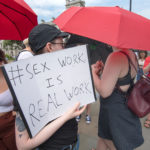NSW Government Antisemitic Hate Crime Bill Tabled in Parliament

The first piece of legislation introduced into NSW parliament for 2025 is a bill to counter rising hate crime that contains provisions that combat hate against people in general in respect of their religion or race, but it also has a particular focus on antisemitism, or prejudice against Jews, as such sentiment has recently been expressed via acts of vandalism targeting synagogues and schools.
Introduced on 11 February, the Crimes Legislation Amendment (Racial and Religious Hatred) Bill 2025 specifically targets the display of Nazi symbols on or near synagogues, it strengthens measures to ensure that when a crime is motivated by hatred towards a particular group, resulting penalties are harsher, and it makes the graffitiing of a place of worship an aggravated offence.
“Disgusting acts of antisemitism and intimidation have no place in NSW – acts designed to divide will not work,” said NSW premier Chris Minns in a statement on Tuesday. “Our package is a strong response to recent antisemitism, but will also protect any person, of any religion. “We are sending a clear message that these disgusting attacks have to stop.”
Since the start of the Israeli-perpetrated genocide against the Palestinians of Gaza commenced in October 2023, there has been a distinct rise in Islamophobic, antisemitic, as well as anti-Israel incidents, in NSW and right across the continent.
But it was some severe anti-Israel attacks on Woollahra properties last November that commenced a spate of crimes that have led to these laws.
Indeed, these laws were first spruiked by Minns in December, and he’s continuing to progress them, despite AFP commissioner Reece Kershaw having made clear to all state and territory leaders at a 21 January meeting of the national cabinet that his law enforcement agency is considering whether a foreign actor is paying local criminals to commit the anti-Israel and antisemitic attacks.
A response to antisemitism
“The bill responds to the numerous recent and shameful incidents of antisemitic graffiti, including on or near synagogues and Jewish schools, and other criminal acts of antisemitism in our state,” said NSW attorney general Michael Daley during his 11 February second reading speech on the bill. “This conduct is abhorrent and not welcome in our community.
“Our government is taking strong action to make sure that our laws address graffiti on places of worship, the display of Nazi symbols on or near places of importance to our Jewish community, and offences motivated by hatred with the seriousness they deserve,” the AG made certain.
These laws have been tabled in parliament after Australian antisemitic envoy Jillian Segal publicly called for antisemitic-specific offences in January in light of a rise in anti-Israel and antisemitic incidents, which was a controversial move in a community where Islamophobia is too on the rise and racism and violence against First Nations people has long been entrenched in our society.
The laws have also been drafted in a political climate that involves a conflation between anti-Israeli sentiment and antisemitism, as earlier vandalism attacks were on buildings and cars and were accompanied by anti-Israel messaging, like “F*#k Israel”, yet these were labelled antisemitic, while the messaging then morphed into clear antisemitism and targeted buildings associated with Judaism.
“The NSW government is… expanding the criminal law to send a clear message that inciting hatred is not just unacceptable, it will soon be criminal,” Daley added in a press release on Tuesday.
The guts of the bill
One of the major amendments contained in the Racial and Religious Hatred Bill is the additional crime added to section 93ZA of the Crimes Act 1900 (NSW), which already contains the offence of publicly displaying a Nazi symbol that now carries up to 12 months inside and/or an $11,000 fine for individuals, while the penalty for a corporation that displays a Nazi symbol is a $55,000 fine.
The new bill inserts subsection 93ZA(1AA) into the Crimes Act to create an aggravated version of the Nazi symbol crime, which means it is more serious and so are the penalties. The new offence is displaying, by public act and without reasonable excuse, “ Nazi symbol on or near a synagogue, a Jewish school or the Sydney Jewish Museum”.
This offence would carry up to 2 years imprisonment and/or a $22,000 fine for individuals, along with a fine of $110,000 applying to corporations.
Section 93Z of the Crimes Act contains the offence of publicly threatening or inciting violence on grounds of race, religion, sexual orientation, gender identity or intersex or HIV/AIDS status. The new legislation ensures that the definition of public act contained within the provisions of this offence will be updated to state that graffiti is considered to be a public act.
The legislation also contains a provision for the minister to review the effectiveness of the laws after the period of two years.
Section 21A of the Crimes (Sentencing Procedure) Act 1999 (NSW) lists aggravating and mitigating factors that apply when judges are handing down sentences in respect of crimes that involve such factors. Aggravating factors make the penalties that apply to an offence more severe, while mitigating factors lessen the criminality of an offence.
The bill amends subsection 21A(2)(h), which contains the aggravating factor of being motivated to commit an offence due to “hatred for or prejudice against a group of people to which the offender believed the victim belonged”, so that such hatred aggravates an offence either “partially or wholly”, which ensures that hatred can be shown to aggravate a crime even when it is not the only motivator.
A further provision also aims to ensure that new subsection 21A(2)(h) applies to crimes committed post the amendment and also pre-amendment.
The bill further amends the offence of marking a premises or property contained in section 4 of the Graffiti Control Act 2008 (NSW). Subsection 4(1) contains the crime of marking a premises or property without owner consent, which carries a $440 fine, while subsection 4(2) carries up to 2 years prison and/or a fine of $2,200, when this crime is committed in circumstances of aggravation.
This offence is currently aggravated when it is perpetrated using a graffiti implement and the resulting graffiti is not easily removed with soap and water. The bill would also make the crime aggravated if it was committed upon a place of worship.
A dangerous conflation
These laws are controversial not only because they raise one type of racial or religious hate present in the community as warranting attention above all others, but also due to the political and media campaign that has led to them having been linked to a conflation propagated by the Israeli state, which equates political criticism of it with antisemitism.
Renowned US academic Professor Judith Butler confirmed last year, this conflation has been in use since the 1970s and it serves to deflect criticism of the apartheid state’s settler colonial policies that have increasingly led to the dispossession of the Palestinian people from their land.
As the Woollahra vandalism attacks in late 2024 and others like them at the time contained anti-Israel messaging at a point when that nation was involved in the mass slaughter of civilian Palestinians, and the framing of these crimes as antisemitic was criticised as it repeated the pattern of how the conflation has been applied to shield Israel from criticism for the last half century.
So, the danger with the hate laws is that while they may prevent the antisemitic messaging that most people have an adverse reaction to, they’re also likely to prevent criticism of Israel, which is a rogue genocidal apartheid state that’s right now threatening the collapse of international law.
“I would like to conclude by thanking the NSW Jewish Board of Deputies and special envoy to combat antisemitism, as well as the various NSW government agencies, for considering the bill and providing valuable feedback,” said Daley in ending his second reading speech.
“This bill is one part of a suite of reforms that our government is introducing to tackle antisemitism in our state, protect places of worship, and stand against hatred and prejudice. I commend the bill to the House,” the AG concluded.







